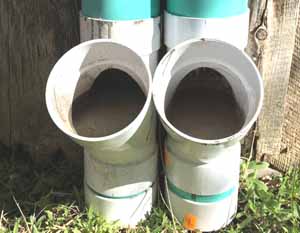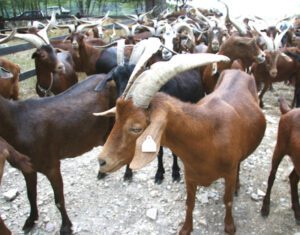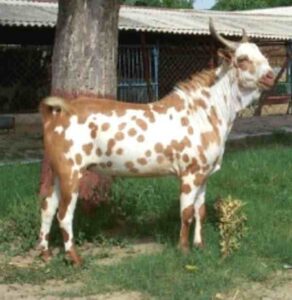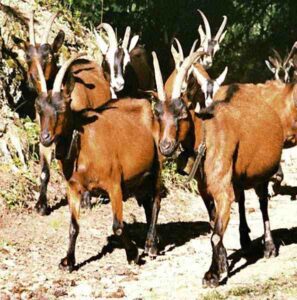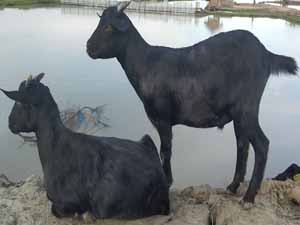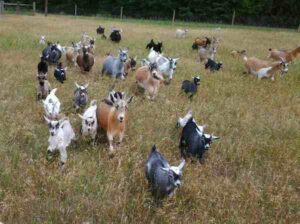The Damascus goat is a breed of domestic goat generally used for milk production. It originated in Middle East countries, and was mainly raised in Cyprus, Lebanon and Syria. The breed is also known by some other names such as Aleppo, Baladi, Chami, Damascene, Halep and Shami. The Damascus is a native goat breed of the Middle East, and it has been raised in big herds throughout the region. And the breed was imported by Antoniades family and then by the British into Cyprus, where its qualities were improved by breeding. The breed was exported by the British at some time in the nineteenth Century.
The Damascus goats were taken to Cyprus, where they were then bred and raised in large numbers. And during this time the breed acquired the name ‘Damascus’. Damascus was mentioned in many classics of Arabic literature. In fact, the breed appears in the religions and folklore of the region as well.
Because of being noble and having striking characteristics, the Damascus goat was used for developing many other goat breeds. And there has been interest in the breeding and genetics of this goat. A Damascus goat named Qahr won the first prize for the “Most Beautiful Goat” title at the Mazayen al-Maaz competition in Riyadh on June 13, 2008. Some people call Damascus the ‘bulldog’ of goats, mainly due to its appearance. It is a multi-purpose breed and used for meat, milk and hide. Here we are trying to describe more information about this goat breed.
Origin And History of Damascus Goat
The Damascus goat has a long and glorious history. Its origin can be traced back to the Middle East, where it is believed to have been bred for thousands of years. It was originated in the regions of Syria, Lebanon, Jordan, and Israel, and was traditionally raised by nomadic tribes in these areas.
The breed was bred for its ability to thrive in arid and semi-arid environments. It was able to survive on sparse vegetation and limited water sources in its native area. As a result, the breed has developed a number of unique physical adaptation traits that allow it to survive in harsh conditions.

Characteristics
The Damascus goat is a beautiful breed of domestic goat that is known for its distinctive physical characteristics. It is large in size and is of the Nubian goat type. These goats are usually red or brown in color, but can also be seen in pied or grey color. They are usually long haired, and they can be either horned or polled. Fully grown goats have a long neck and long legs. Their head is relatively small. Like most other goats, the Damascus bucks are usually larger and heavier than the does. The bucks on average weight about 70-90 kg. And the average weight of the does is about 50-60kg.
Skull
The Damascus goat skull my be preserved or used as a decorative or symbolic object in some cultures. It reflect the breed’s importance and the pride of ownership. It skull has unique shape and features which make it a popular and interesting subject for those who are interested in anatomy, zoology, or cultural artifacts related to animal husbandry. The Damascus goat skull has a prominent convex shape, especially around the nasal bridge and this feature gives this goat it’s distinct Roman nose. And the Roman nose is one of the breed’s most recognized traits.
The Damascus goat skull is relatively elongated with well-defined and somewhat elongated nasal area. The breed’s distinct head shape is due to the length of the skull combined with the convex shape. The eye sockets or orbits are large and round. The placement of the ear openings on the skull is lower and are more pronounced, and the forehead of these goat is broad.
Size
The Damascus is a large goat breed. The bucks are much larger and heavier than the does. Average body height of the mature bucks is between 31 to 35 inches at the shoulder. And average height of the does is between 27 to 31 inches at the shoulder. Average body weight of the mature bucks is between 70 to 90 kg. The does are slightly less heavier than the bucks with an average body weight between 50 and 70 kg.
Housing/Shelter Requirements
Like many other domestic goats, the Damascus goats also have some specific housing/shelter requirements depending on the local climate and environment. You have to provide a safe and comfortable living environment for your goats, by providing them adequate space, shelter, flooring, feeding and watering stations, fencing, and sanitation. The Damascus is a large breed and these goats require at least 10-15 square feet housing space per animal in their living area, and 20-30 square feet space in the playing area.
The type of shelter used for Damascus goats depends on the local climate and some other factors. A simple shade shelter may be sufficient in hot and dry climates. But in case of colder climates, a more secure and substantial structure with walls and a roof is required to protect the animals from wind, rain, and snow. Ensure that the shelter is well-ventilated and free from drafts. The flooring system should be sturdy, non-slip, and easy to clean. Concrete, gravel, or packed earth are all good options. Avoid flooring materials that can trap moisture or harbor bacteria (such as untreated wood or soil).
Making secure and sturdy fencing is an important consideration, as these goats are known for their ability to climb and jump. A height of at least 4-5 feet is recommended, with additional precautions (such as electric fencing or wire mesh to prevent escape). Clean their house on a regular basis in order to prevent the spread of disease and parasites. Remove and replace the bedding regularly, and clean the flooring and walls with a disinfectant solution to kill any harmful bacteria or viruses.

Dietary Requirements
Like most other goat breeds, the Damascus goats also require very good quality and nutritious food for keeping them healthy, active and productive. These goats are very good for producing milk. So, try to add adequate greens in their diet for good milk production. And always provide them with clean and fresh water as per their demand. Roughage is an essential component of their diet. Roughage provides required fiber for good digestion. Good sources of roughage for these goats include hay, straw, and pasture grasses.
Concentrates are required for the good health of your goats. Supplements that provide additional nutrition to the goat’s diet, include protein, vitamins, and minerals. And good sources of concentrates include grain, soybean meal, and commercial goat feed. Mineral supplements are also very important for the goats to maintain good health. Mineral supplements provide essential nutrients that may be lacking in their diet. Good sources of minerals for Damascus goats include salt, calcium, and phosphorus. Provide mineral supplements in a separate feeder, as goats have a tendency to waste or soil their mineral supplements.
Along with feeding hay, supplements and concentrates, Damascus goats also require access to pasture or forage in order to meet their nutritional needs. Rotate the pasture regularly to prevent overgrazing, and forage should be free from toxic plants or weeds. Always provide them enough clean and fresh drinking water as per their demand. Avoid feeding them contaminated food and polluted water.
Reproduction/Breeding
These goats are naturally very good breeders. Natural breeding is generally practiced for these goats. One buck is generally enough for breeding up to 30 does. The breeding season typically runs from August to December (with the peak breeding season occurring in September and October). During this time, female goats will come into estrus and be receptive to breeding. Once a female goat has been successfully bred, she will carry her pregnancy for five months (approximately 150 days). Closely monitor the doe during this time to ensure that she is receiving proper nutrition and veterinary care.
Behavior/Temperament
Along with its distinctive appearance, the Damascus goat is also known for its distinctive behavior and temperament traits. They are naturally docile, calm and cooperative. And they are well-suited for various agricultural practices.

Lifespan
Average lifespan of a Damascus goat is around or up to 12 years. Although, exact lifespan can vary and depends on numerous factors.
Uses
Damascus is a dairy goat breed and mainly used for milk production. But they are valued not only for milk, but also for meat. They are highly meat productive.
Popularity And Price
The Damascus has a varying levels of popularity and price depending on the region, purpose and specific breed traits of individual animals. It is particularly popular in it’s native regions, such as Syria and Lebanon. But due to it’s adaptability and high milk production the breed has been exported to many other countries around the world, including Cyprus, Turkey, and some African nations.
It’s not possible to tell the exact price of a Damascus goat. Because, it’s price can vary depending upon age, gender and your location. The price of breeding bucks is often higher, especially if they come from a strong bloodline. Does with good milk production are also highly valued. On an average, price of a mature Damascus goat can vary between $200 to $1000. Exact price can be higher or lower depending on the factors mentioned above.
Special Notes
The Damascus goat is described as being noble, and having striking characteristics. They are very beautiful and used in the creation of many other popular goat breeds. The does can give birth to three to four kids per kidding, if given the proper care. The does are pretty good milk producers. On an average the does can produce up to 1.5 kg milk daily.
The milk of the Damascus goat is noted for being extremely easy to digest for anyone who may have issues digesting more normal dairy products. They are usually of good behavior and have a relatively calm temperament. Review the full breed profile of the Damascus goat in the following chart.
| Breed Name | Damascus |
| Other Names | The breed is also known as Aleppo, Baladi, Chami, Damascene, Halep or Shami. |
| Breed Purpose | Milk |
| Breed Size | Large |
| Buck | About 70-90 kg |
| Doe | About 50-60 kg |
| Horns | Can be either horned or polled |
| Climate Tolerance | All Climates |
| Coat Color | Usually red or brown in color, but can also be seen in pied or grey. |
| Good for Stall Fed | Not Sure |
| Rarity | Common |
| Country/Place of Origin | Syria |
